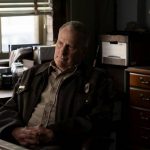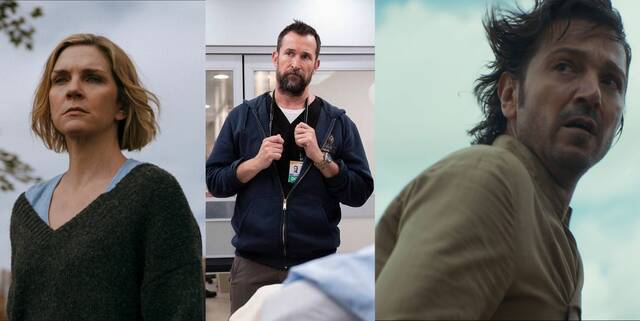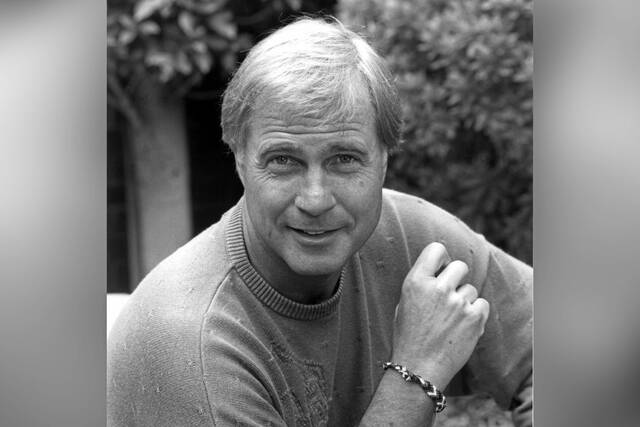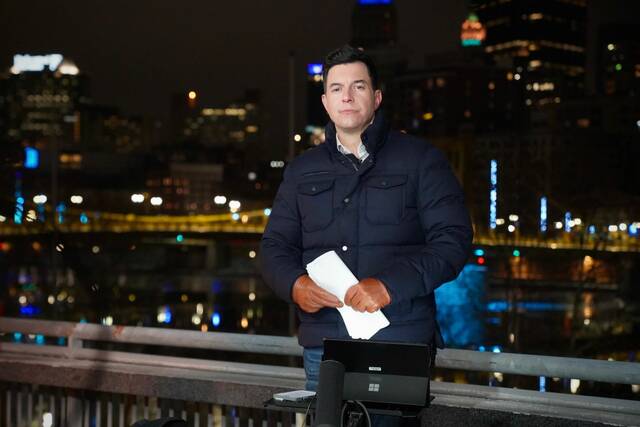Spoiler warning: This article includes spoilers for the season-one finale of Showtime’s filmed-in-Pittsburgh “American Rust” that aired at 10 p.m. Sunday, Nov. 7.
While the first season of “American Rust” began at a glacial pace, the show steadily improved through its nine-episode run, culminating in Sunday’s chickens-coming-home-to-roost first-season finale. If the series had been as eventful from the start, it may have garnered a more positive initial impression.
But showrunner Dan Futterman said the slow start to “American Rust” was by design.
“This was the intentional experiment because if you’re not experimenting, it’s not worth doing,” Futterman said. “How much story is enough story so that we can really get to know these characters so that by the time we’ve hit 60, 70, 80 mph we really care whether they crash or they don’t? There’s a formula to crime shows that we didn’t want to follow. I understand there were some people that thought three or four episodes was too long to really kick into gear. I don’t feel that way. I love the way the show is paced out, but I know where we get to and if you stick with it, it’s well worth the ride.”
The first season ended with Buell sheriff Del Harris (Jeff Daniels) killing the drug dealer – and also Buell pharmacist Jackson Berg (Dallas Roberts) – who was going to testify against the wrongly-imprisoned Billy Poe (Alex Neustaedter), son of Harris’ beloved Grace (Maura Tierney), for the murder of crooked cop Pete Novick (Jim True-Frost). Del arranged the crime scene to make it look like the dealer shot Jackson. Novick was actually killed by Isaac English (David Alvarez) who came to the defense of Billy.
Harris’ deputy Steve Park (Rob Yang) suspected his boss was up to something while Harris was questioned by Pittsburgh cops about an earlier shooting just as Isaac, who’s been on the run, returned to Buell and tried to turn over the wrench he used to kill Novick. Harris calmly but firmly told Isaac, “Put it back in your pocket and never show it to anybody.”
Although based on the a novel by Philipp Meyer, the TV series takes a lot of liberties with characters and relationships in its adaptation from the book but the final scene of the first season does basically end where the novel ended.
Below Futterman answers more questions about “American Rust:”
Q: I don’t think I initially realized “American Rust” is not set in the present, but then I started to notice an abundance of flip phones, which made me wonder, what year are we in here?
Futterman: We set it in 2014, 2015. We tried to subtly get at that with Hillary Clinton on the TV in the bar. In part, we just didn’t want to deal with any of the divisive politics that since that time have happened. It just didn’t seem important to the story. The flip phones are slightly a matter of time and slightly a matter of class, of your financial ability.
Q: I am so curious about the scene several episodes back where Isaac, acting as a sex worker, has his first encounter with a client who asks him to low like a barnyard animal and by the end of the scene, the expression on Isaac’s face is one of bliss.
A: Isaac’s journey was something different from the book. I love the book but this was a story that we wanted to steer in a different direction with Isaac, his homosexuality being a major part of it. That doesn’t exist in the book. … I think we all liked the notion that he would turn a trick but that it would actually be enormously sexually liberating for him. Paid for or not, it’s his first real sexual experience. It seems like it’s going to be a little scary and strange and this guy’s a real strange person, but it turns out that this guy’s a fairly passive and gentle person and that is a liberating experience for [Isaac]. Writers’ rooms can be interesting places where nobody is forced to share personal stories but people tend to because that’s what you write. Some people have got a lot of personal stories and we talked about it for a while. What could this be? What would be interesting? What would be fun to watch, weird to watch, something strange that turns into something else? So that’s where we ended up.
Q: One of the things I really liked about “American Rust” as it went on is how the Grace character was revealed to be pretty manipulative, initially in the car scene where she tries to ruin the marriage of Lee English (Julia Mayorga) and her husband because Grace knows her son Billy still loves Lee. And then in the finale to have Grace’s estranged husband, Virgil (Mark Pellegrino), tell Harris (Daniels) that Grace is manipulating him and as awful as Virgil is, he’s right. Grace burned down her own trailer and it made me think, did she also blow up her own car a few episodes back?
A: The first-season theme for us was how far are you willing to go for love or how far are you willing to go for the people that you love? And we were not talking in a metaphorical or theoretical way — were talking very literally: Do you kill people? Do you set up crimes and pretend that these crimes have had been perpetrated by other people? That’s what we wanted to push to the breaking point and Maura said something to me while shooting that I thought was insightful and she thought was really clarifying for her character, Grace – which is that when you talk about the men in her life, the real man in her life is Billy. And when it’s how far are you willing to go for love, for her it’s for her son, and when push comes to shove, nothing else matters. Now whether that would change in a potential second season to whether Harris and Grace have been so fused together by what they did or has something fractured between them is an open question and something that I’d be excited to explore.
Q: But in your mind, did Grace blow up her own car or did someone else do it?
A: That was a storyline we didn’t have time to follow through on. We know exactly who did it. Grace burned down her house; she didn’t firebomb her car.
Q: Was her manipulative turn planned from the start?
A: Yeah, in part. A large part of that is credit to Maura, who is such a versatile actor and understood where the arc went. The turning point for [Grace] is when she loses the union vote and she says, ‘I’m done playing by the [expletive-ing] rules,’ and that means in all areas of her life including the emergency in her life, which is Billy. So, yes, she’s willing to do whatever it takes. And she knows the person who has the means to do whatever it takes, and that’s Harris. What the two of them play pretty brilliantly is that there is genuine connection and emotion between them. But can you have two different reasons for doing something or just one? Does one subsume the other? And that’s the question. I didn’t go into it with Maura as to what is it that you’re actually feeling for Harris. What is it that you’re manipulating? How much of your time with me are you actually thinking about Billy? That’s her own thing to figure out. That’s a private thing for a very talented and experienced actress to figure out. Whatever she was doing, it worked.
Q: My assumption is elderly Henry English (Bill Camp) overdosed on the pills from the empty containers Lee found in Henry’s house and Henry died, but Billy will survive the coma from his prison beating. Fair?
A: Tune in to a possible season two to find out!
Q: In the premiere episode viewers saw Harris hide Billy’s jacket inside Carrie Furnace. But we never saw anyone find it. But in the finale sheriff Frank DeLuca (Namir Smallwood) goes back to Carrie Furnace for one last look but then we never see him come out…
A: We’ve got a hanging chad. I like that you have all these questions. This is exactly where we want you to be.
Q: In the season finale, detectives from Pittsburgh come to Buell to ask Harris questions about the death of his former fellow Pittsburgh cop Chuck Castellanos (Danny Mastrogiorgio). Harris asks, “Is Chief Harper still running things into the ground up there?” The detectives say Harper’s retired. Was that an intentional reference to the actual Pittsburgh Police Chief Harper who pleaded guilty in 2014 to charges of conspiracy to commit theft and failing to file his federal tax returns from 2008 through 2011?
A: No, I did not know [about] that. I was not aware of this.
Q: You’ve written yourself into a lot of corners with the first-season finale, particularly with regards to Harris. Do you know how you’d get out of them in a potential season two?
A: We’re starting to think about it now. In the way that the characters do, you do what has to be done and then you figure out the next step. A few of the writers and I have been discussing this very thing in hopes of potential season two. If nothing else, Harris is resourceful and so you are right that where we were trying to get with him is to tighten the vise as much as possible on him and let’s see if he can wriggle out of it or not.
Q: What do you think the odds of a season two are at this point?
A: To be perfectly honest, whatever wisdom I have accrued is don’t pay attention to things you can’t control. I am paying much more attention to whether we can write a great season of television and none of these decisions are mine so I just take myself out of the equation.











